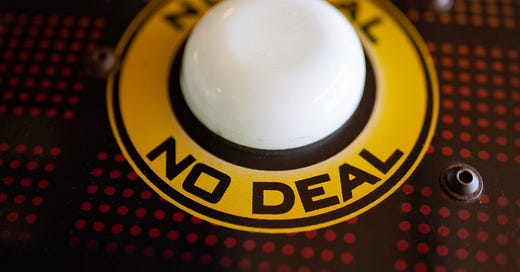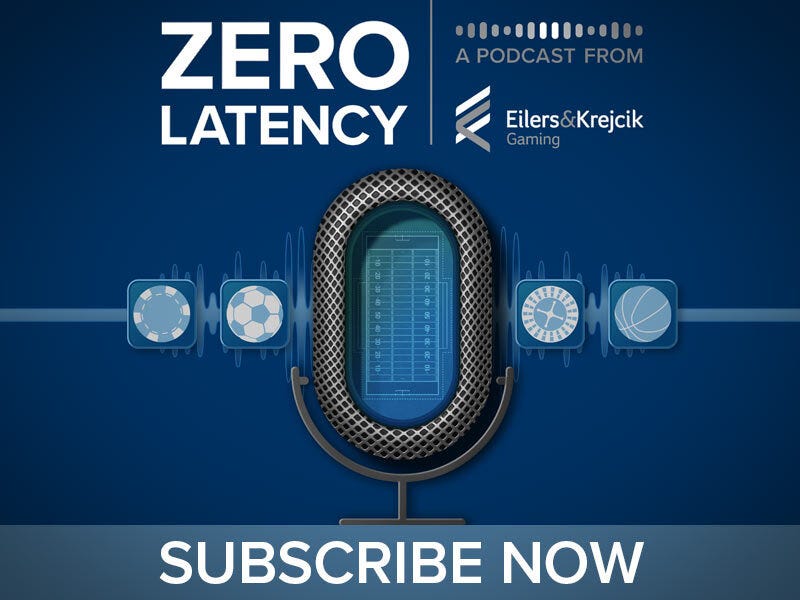Minnesota Autopsy Report
How close was Minnesota to passing a sports betting bill? Supporters say there was a breakthrough, and they simply ran out of time.
The Bulletin Board
NEWS: Post mortem on Minnesota’s failed attempt to legalize sports betting.
BEYOND the HEADLINE: Minnesota statements require you to know how to speak politician.
LOOSE ENDS: FanDuel crushing in DC; WSOP POY changes; US hits $1 Trillion in iGaming handle; SCOTUS decision coming?
NEWS: ESPN Bet’s numbers are decent, except for one key metric.
QUICK HITTER: Google update takes a toll on gambling affiliates.
AROUND the WATERCOOLER: Al Jazeera US expose on problem gambling.
STRAY THOUGHTS: Some podcasts you should be listening to.
SPONSOR’S MESSAGE - Sporttrade was borne out of the belief that the golden age of sports betting has yet to come. Combining proprietary technology, thoughtful design, and capital markets expertise, our platform endeavors to modernize sports betting for a more equitable, responsible, and accessible future.
Sporttrade is now live in Iowa, alongside Colorado and New Jersey.
How Close Was Minnesota to Passing a Sports Betting Bill
Six times was not the charm, as sports betting came up short again in Minnesota. But if you listen to the post-failure chatter, a lot of progress was made, with supporters saying they were closer than they have ever been to passing a sports betting bill. The belief is they can pick up where they left off and carry the framework that “ran out of time” over to 2025.
But is there really an agreed-upon framework? Knowing there was no time to pass a compromise bill, it’s likely some of the support was tepid. There is also the not-so-small matter of legislative turnover, with elections coming in November.
As Twin Cities Business put it, there are at least two questions:
“If the deal was there, why didn’t it pass? And what was in what sponsors call “a framework” that untied the political knot that has flummoxed supporters in the past?”
TCB does an excellent job of breaking down what has been made public about the compromise effort (a definite must-read article), but I would highlight that the final compromise is significantly different from the numerous other compromise efforts in 2024, which makes me more skeptical that the deal was a whisker away from passing and just needed slightly more time.
Beyond the Headline: How to Speak Politician
The Twin Cities Business article also provides a glimpse into what I call “speaking politician.” It’s a skill developed over time that mentally bolds all qualifiers a politician uses to get to the true meaning.
Stage one of speaking politician is noticing sentences that start with “I think” or “I believe.”
The TCB article provided several examples of this.
“We believe we have the support of the tribes, the tracks, the charities, bipartisan support in both chambers, if we had the opportunity to have it on the floor for a vote,” said Rep. Zack Stephenson, the Coon Rapids DFLer who has been pushing for a bill.
“I think if we had another 48 hours, I think we could do this,” said GOP Rep. Pat Garofalo of Farmington. “I sincerely mean that. We really could.”
“I think there was a lot of skepticism that at the end of the day you could find a deal that the tribes and the tracks could both support, and we believe we’re there,” Stephenson said. “It’s a major accomplishment … I think it sets the stage for future action. Now we know that the deal is there to be had.”
Generally, I give little credence to these types of statements. Politicians know the vote count and what entities support or oppose the measure. There is no need for “I think” or “we believe.”
A more expert-level stage of speaking politician is how to spot when a bill is all but dead. One giveaway is when a politician name-drops a colleague or colleagues as the roadblock — a clear signal that negotiations have broken down.
Loose Ends: FanDuel Crushing in DC; WSOP POY Changes; $1 Trillion; SCOTUS Decision Coming?
FanDuel turns around the DC sports betting market: After taking over from GambetDC, FanDuel’s early performance is a clear indication of just how bad things were in the nation’s capital. FanDuel generated $30 million in betting handle in its first month, a 673% increase. Frank Suarez, the Executive Director of OLG, said in a press release that “FanDuel’s first 30 days have not only met but exceeded expectations.”
WSOP adjusts Player of the Year rules: The World Series of Poker has modified how it tabulates Player of the Year points for the 2024 series. The new rules downplay volume and online events, as only the Top 10 scores will be counted, and only one can be from an online event. Some see this as a move toward quality over quantity, while others see it more cynically, believing the WSOP is trying to ensure the POY is a household name and not an up-and-comer.
US online gambling hits a milestone: The US online gambling industry (sports betting, online casino, online poker, and a category simply called other) has eclipsed $1 trillion (Dr. Evil voice) in the handle, per analysis from Bonus.com. It’s a fun number, but handle is relatively meaningless, particularly on the casino/poker side.
SCOTUS decision on the West Flagler case on June 13: Per Robert Linnehan, “The Florida online sports betting case has been “distributed for conference” to SCOTUS Justices for a Thursday, June 13 discussion. SCOTUS Justices will review the case on that date to determine if the writ of certiorari will be granted.
SPONSOR’S MESSAGE - SUBSCRIBE NOW to Zero Latency, the new podcast from Eilers & Krejcik Gaming that provides unparalleled insight into the U.S. online gambling industry through interviews with industry insiders and analysis from EKG experts.
Fanatics and ESPN Bet on Opposite Sides of the VIP Coin
Sports betting VIP programs have been thrust into the spotlight.
There are several high-profile betting scandals involving very big bettors, a public spat between DraftKings and Fanatics over a VIP executive, and Fanatics’ recent revenue boost in New Jersey.
Fanatics has rocketed to the #2 spot in the New Jersey sports betting market. By most accounts, its sudden rise is due to a single VIP player that seems to have been poached from DraftKings.
“As with any industry, there is a cohort of customers that spend a lot, and that drives a decent amount of the revenue,” DraftKings CEO Jason Robins said during the company’s most recent earnings call to downplay the VIP shift. “But I think especially relative to other companies in the industry, we’re much more diversified. And the trend we’re seeing is more and more casuals coming to the market.”
On the other side of the ledger is ESPN Bet. After shifting from Barstool Sports to ESPN, Penn has seen its unique depositing customers (now called MUPs – Monthly Unique Payers) increase by more than 150%, according to Eilers & Krejcik Gaming (a newsletter sponsor). But, its ARPMUP (average revenue per monthly unique payer) has been cut in half — Barstool was previously on par with DraftKings. Penn’s digital ARPMAU is around $27 per EKG or roughly one-fifth of DraftKings ($115).
As CEO Jay Snowden put it during the company’s earnings call, “Deposits are coming through, users are engaged, but the average bet size has been lower.”
Snowden cited feedback and research indicating that its parlay and SGP products lag behind competitors and closing the gap before the NFL season is a “top priority.” Another connected priority he mentioned was VIPs.
Quick Hitter: Latest Google Update Hits Gambling Affiliates
Yours truly wrote an article for Casino Reports on the impact of the latest Google update on gambling affiliates. The updates had a positive impact on core affiliate sites, but look to be a death knell for the affiliate-legacy media deals that have been all the rage in recent years.
As I wrote in the Casino Reports column, the update “boosted affiliates’ core content but leaves affiliates trapped in what increasingly looks like costly zombie deals — in some cases, deals with eight-figure annual guarantees and highly unfavorable revenue splits.”
As for those guarantees, “Sources pointed to 30/70 and even 20/80 revenue splits and guarantees to the legacy media companies as high as $15 million per year.”
This is a story worth watching, and reading, considering the dearth of new state sports betting and online casino launches for the foreseeable future.
Around the Watercooler
Social media conversations, rumors, and gossip.
The on-camera experts use an awful lot of hyperbole, but this is a pretty good look at how the US online gambling narrative is unfolding from Al Jazeera US.
Some interesting aspects:
Kavita Fischer’s story is far more sympathetic on camera than in print.
Gronk handled the question of responsible gambling quite well, yet the major companies declined to speak with Al Jazeera US.
The segment touches on the growing skill-game app sector, which Fischer used as a workaround.
Stray Thoughts
Some podcast news.
Will Green from Robn Sports (who penned this excellent take on the Shohei Ohtani betting scandal) has launched the RobnPod and already had a pretty good get, with Sportico’s Eben Novy-Williams joining him for a discussion on “venture capital’s initial foray into college athletics as well as the landmark athlete-compensation settlement last week in House vs. NCAA.”
My podcast with ESPN’s David Purdum will be available to all tomorrow (you can get early access by becoming a paid subscriber). We discussed betting scandals, bettors harassing athletes, and more.
You can find all my podcast episodes here.





